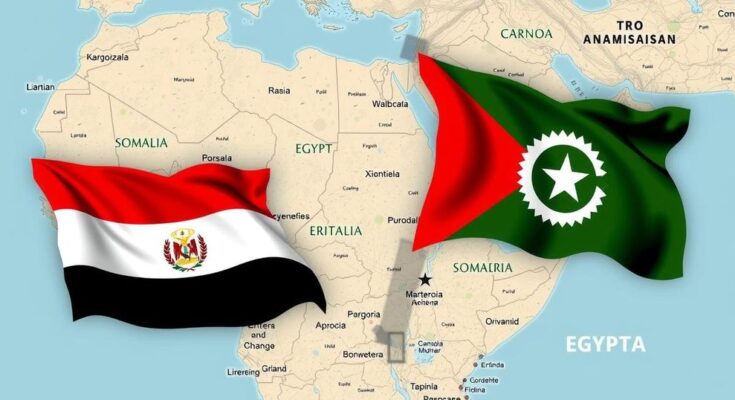Egypt is strengthening its ties with Eritrea and Somalia to counter perceived threats from Ethiopia. In October 2024, leaders from these nations convened in Asmara to discuss military cooperation and support for Somalia’s counterterrorism efforts against Ethiopia’s expanding influence. This evolving alliance is a strategic response to tensions surrounding the Grand Ethiopian Renaissance Dam and impending maritime disputes in the region.
In a strategic response to perceived threats from Ethiopia, Egypt is enhancing its alliances with Eritrea and Somalia. In October 2024, the leaders of all three nations convened in Asmara for a summit focused on bolstering military cooperation and stability in the region. They pledged to support Somalia in its counterterrorism initiatives, with Egypt agreeing to deploy troops under the African Union mandate, a move that directly counters Ethiopia’s growing influence in the Horn of Africa.
This alliance is primarily motivated by the ongoing tensions surrounding the Grand Ethiopian Renaissance Dam (GERD), which Egypt views as a direct threat to its water security. Additionally, Ethiopia’s recent maritime agreement with Somaliland has raised alarms in Cairo and prompted Somalia to strengthen its ties with Egypt and Eritrea. Analysts characterize this trilateral summit as a significant maneuver by Egypt to regain its influence in the region amidst escalating tensions concerning Nile water rights and maritime access to the Red Sea.
The ambition of Ethiopia to regain maritime access has provoked concerns in Somalia, which perceives this move as a potential threat to its territorial integrity. Consequently, this has led to a reinforced strategic cooperation between Egypt, Eritrea, and Somalia. Egypt is not merely engaging in diplomatic negotiations; it has initiated arms shipments to Somalia and established a joint committee of foreign ministers to manage strategic collaborations across multiple areas.
As hostilities continue to mount, this consolidated alliance may fundamentally alter the balance of power within the region, possibly intensifying military and diplomatic tensions. The forthcoming months will be vital in assessing the implications of this strategic alignment on ongoing disputes regarding Nile and Red Sea access.
The dynamics in the Horn of Africa have been shaped by long-standing disputes over water rights and territorial integrity, particularly surrounding the Nile River and the Red Sea access. Egypt’s concerns regarding the GERD are central to its foreign policy, as the dam is expected to significantly impact its vital water supply. Ethiopia’s engagements with Somaliland and other regional players are perceived as efforts to extend its influence and reclaim maritime access, which has heightened regional tensions. Egypt’s recent attempts to solidify its alliances with Eritrea and Somalia are seen as an effort to counter these challenges and maintain its strategic interests in the region.
In summary, the alliance between Egypt, Eritrea, and Somalia signifies a substantial shift in regional geopolitics in response to Ethiopia’s aspirations and maritime agreements. This strategic partnership aims to assert military cooperation while addressing mutual concerns regarding territorial integrity and resource management. The developments in the coming months will likely further influence the delicate balance of power and the ongoing confrontations over Nile water rights and access to the Red Sea.
Original Source: www.garoweonline.com




